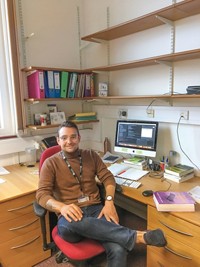Advertisement
Grab your lab coat. Let's get started
Welcome!
Welcome!
Create an account below to get 6 C&EN articles per month, receive newsletters and more - all free.
It seems this is your first time logging in online. Please enter the following information to continue.
As an ACS member you automatically get access to this site. All we need is few more details to create your reading experience.
Not you? Sign in with a different account.
Not you? Sign in with a different account.
ERROR 1
ERROR 1
ERROR 2
ERROR 2
ERROR 2
ERROR 2
ERROR 2
Password and Confirm password must match.
If you have an ACS member number, please enter it here so we can link this account to your membership. (optional)
ERROR 2
ACS values your privacy. By submitting your information, you are gaining access to C&EN and subscribing to our weekly newsletter. We use the information you provide to make your reading experience better, and we will never sell your data to third party members.
Careers
Cultural Chameleons
For foreign-born job seekers, cultural awareness is the first step toward a successful career
by Linda Wang
November 5, 2007
| A version of this story appeared in
Volume 85, Issue 45

XIPENG LIU REMEMBERS the first time his thesis adviser at Brown University kidded around with him. Not knowing how to respond, Liu froze like a deer caught in headlights, he recalls. Gradually, he started to feel more comfortable in these situations and even began engaging in lighthearted banter himself, he explains.
"I started to appreciate how humor plays such an important role in people's lives," says Liu, who came to the U.S. from China in 2000 to pursue a Ph.D. in chemistry. "It's a totally different attitude in the Chinese culture." People in China are very serious, he says, especially around their superiors.
Liu considers himself extremely lucky that his adviser, chemistry professor William M. Risen Jr., made him aware of American idiosyncrasies early on in his graduate training. Risen also helped Liu improve his interviewing skills by suggesting he speak more slowly. From others at the university, Liu learned the art of making eye contact and delivering a firm handshake.
The preparation paid off. When it came time for Liu to interview for his first job, he passed with flying colors. He says he even joked around a bit during the interview to help break the ice. Now, Liu is lead product development chemist at Arkwright, a company in Coventry, R.I., that produces specialized coatings for digital imaging media.
For foreign-born chemists like Liu, assimilation into the American culture is a rite of passage filled with growing pains. An attempt at humor that falls flat, for example, may elicit considerable consternation, says Liu. "You were trying to tell a funny story, but it ended up becoming boring, and you become embarrassed," he says. "That's not good." Liu admits that he's had his share of jokes that went bad. Nevertheless, he says, "the more you practice, the more it becomes a part of you."
Liu recognized the areas where he needed to improve and worked on them, but many foreign-born chemists don't realize when they're undermining their job search success, says Miriam Swiler, vice president of human resources and public relations at IRIX Pharmaceuticals, in Florence, S.C. For example, she says, some foreign-born job seekers don't want to come across during an interview as being too aggressive because they consider it a sign of disrespect. Consequently, they come across as being timid and unmotivated, says Swiler.
"We may appear timid to the interviewer, not because we are, but as a way of showing respect," explains Natasha R. Mwale, a fourth-year graduate student in chemistry at the University of Cincinnati who is from Zambia. "That may work to our disadvantage in a job interview because we may not seem like go-getters, or it may seem as if we're not assertive when in fact we're just toning ourselves down."
Rajesh Murthy, a research associate in chemistry and biochemistry at South Dakota State University, understands how it feels to be misunderstood. The native of India says he practices speaking slowly and deliberately pauses before answering a question. "We have a tendency to answer interview questions too quickly because we're eager to impress the other person," he says, whereas in the U.S., this could be misinterpreted as not having given a question much thought. Murthy also encourages job seekers to ask questions if they don't understand what an interviewer is saying. That doesn't mean you're not paying attention, he says; it means that you care about understanding the interviewer correctly.
In the U.S., job seekers are encouraged to sell themselves during an interview. But in many other cultures, the emphasis is on modesty. "When I had to go out there and sell myself, I felt very uncomfortable," says David N. Rahni of his early job-seeking experiences. "It's a psyche, and that psyche has been instilled in us for generations." Rahni, now a professor of chemistry at Pace University in New York City, came to the U.S. from Iran in the 1970s but believes that foreign-born job seekers today still feel the same type of cultural disconnect he felt back then.

ASSIMILATING INTO a new culture doesn't happen overnight, and many foreign-born chemists say the key is to start early. Graduate school may be one of the best places to practice. "Take advantage of the opportunity," advises Liu. He stresses the importance of having a diverse group of friends with whom to practice English and learn social norms.
Nurtay Urdabayev, a research scientist at ThermoFisher Scientific, says it's all too easy to settle into a comfort zone where all your friends speak your native language. Urdabayev is from Kazakhstan but spent four years in Russia before moving to the U.S. When he started graduate school in the U.S. in 2001, he surrounded himself with Russian-speaking friends. It wasn't until he began dating a Turkish student who didn't speak any Russian that his English began to improve. Encouraged by his progress, Urdabayev subsequently sought out a more diverse group of friends and made further improvement in his English.
Swiler says she can tell right away when a foreign-born job seeker has made an effort to improve his or her English. In fact, she says she has interviewed some candidates who have become so proficient in English that she couldn't tell them apart from native speakers.
She says that many of the positions at IRIX require strong English skills. "A lot of our chemists have to communicate with our clients if they're leading a project," she says. "If you're going to have that kind of a responsibility, it would be hard to overlook [a lack of English proficiency] during the interview."
There are exceptions. "If you see a student who's really on fire with knowledge and with enthusiasm, and you know they really want to do their part, I think a recruiter will be much more encouraged to go the extra step with them," she says. Swiler notes that for employees of this caliber, IRIX will hire an English-as-a-second-language instructor to come in and work with them.
Foreign-born chemists say that assimilating into the U.S. work culture entails a long-term investment. "I can pretend to be more outgoing during the interview," says Uma Tiwari, an Indian graduate student in chemistry at the University of Cincinnati. "What I'm more worried about is after my job interview, once I get the job. I want to feel that I belong in the place."
H. N. Cheng, a polymer scientist at the specialty chemicals firm Hercules who was born in China, says he has to make a mental shift when he leaves home and goes to work. When he's at home, he demonstrates modesty and treats his elders with respect. But at work, he assumes a more assertive personality. "We all have different roles in life, and there is an appropriate behavior for each role," he says.
Bhaskar R. Venepalli, an Indian career consultant and president of CiVentiChem, in Research Triangle Park, N.C., says that on the job one common misperception that foreign-born chemists have is that research should be their number-one priority. "What people don't realize is that if they want to grow in their career, they have to learn a lot of things in addition to doing science," he says.
Murthy agrees: "We sometimes overlook opportunities for networking, such as going out to lunch with our colleagues. A lot of good things can happen during those lunches. You could get some good feedback about your work.
"No one tells us these things, and it keeps adding up," he continues. "Then what happens is you start feeling left out and consequently think that it's because you're foreign-born." Such misunderstandings often prevent foreign-born chemists from being promoted as quickly as their American counterparts, especially in the mid-to-upper career levels, says Rahni.
European chemists are culturally more similar to Americans than are Asians; however, they have their share of cultural misunderstandings. Luca Salvi is from Italy and is a graduate student in chemistry at the University of Pennsylvania. He says that in Italy, graduate students are expected to focus only on their research. In the U.S., graduate students are expected to participate in all aspects of the research experience, including teaching and writing grants. "It's not that I don't care or I don't pay attention to these things," he says. "It's just that in the culture and mind-set where I come from, you don't have to worry about these things at this stage."
Andreas Becker, a research scientist at the H. Lee Moffitt Cancer & Research Institute, in Tampa, Fla., is from Germany and says German scientists tend to be very direct. To an American, he says, this trait may come across as being too critical when in fact they are just drawing from their background in critical thinking.
FOR IRANIAN CHEMISTS, the barriers may not be much cultural as they are political. Rahni says that something as innocuous as having a foreign-sounding name can negatively affect someone's chances of getting a job interview. "If the foreign-sounding name has somehow been plugged into the mind of someone as being synonymous with a potential terrorist they've heard of on television or if the name sounds exotic and peculiar, that in and of itself could be impeding," he says.
Rahni admits that he changed his own name from M. Ali Nabi Rahni to David N. Rahni after moving to the U.S. "I had to change it because Ali to them was 'Ali Baba and the Forty Thieves' in Baghdad." These subtle adjustments make a huge difference, he says.
The potential for cultural misunderstandings can create a lot of anxiety for foreign-born chemists. "We can never be relaxed," says Tiwari. Despite the challenges she's faced, Tiwari says she appreciates the opportunity to study and work in the U.S.
Recruiters acknowledge that foreign-born students are extremely motivated and hard-working, and they bring a different perspective to the workplace. "They try very hard, and their knowledge base is extremely good," says Swiler. "I think that's a credit to them in that they do know they're against a different kind of competition."
Tiwari says the challenges she's faced have made her stronger. "I'm happy with what I went through. Now, I can stay anywhere in the world, and I can survive," she says. Still, sadness creeps into her voice. "We become stronger in the end, but the anxiety is way too much, especially in the first few years. It's so much anxiety and pressure over small, small things."
Liu emphasizes that a solid knowledge base is still the most important thing to recruiters. "If you have an advanced degree, the company wants to hire you because you can bring value to them, not just because you can shake hands firmly or make eye contact. They don't need salespeople, they need R&D," he says.
Liu says he doesn't think that he's compromising his Chinese culture for the American culture. "Don't change yourself, but try to understand the culture and pay attention to what's going on around you so you can have common interests with Americans," says Liu, who has learned to enjoy one of America's favorite pastimes-golf. He says he also keeps up with news, popular music, and television shows to give him some conversation starters with his colleagues.
"In my heart, I'm still Chinese," Liu says. "Learning this stuff is one way to experience a different culture." It doesn't make you shallow, he says, it makes your life richer.









Join the conversation
Contact the reporter
Submit a Letter to the Editor for publication
Engage with us on Twitter